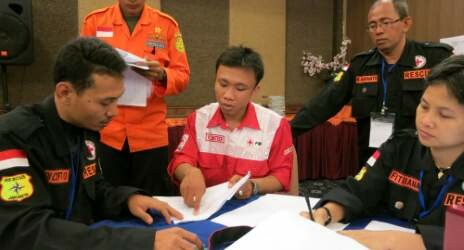
The exercise took place on 25 May 2012, and was conducted with the support of the Indonesian Red Cross (also known as PMI), the IFRC, the Emergency Capacity Building Consortium and Plan International, as part of an INSARAG Table Top Exercise in Padang, West Sumatera from 29 May to 1 June 2012. A total of 77 participants attended the simulation exercise, including government officials from 14 ministries and government institutions, donors, INGOs, and UN agencies.
The aim of the simulation exercise was to explore the challenges faced by BNPB, the district disaster authorities and related ministries in the implementation of the BNPB’s ‘Guideline 22’ (2010), to identify any existing gaps, and improve the guideline where necessary.
Guideline 22 addresses the role of the international community in emergencies and disaster response operations, and the simulation examined how the government would function in terms of dealing with incoming international assistance. It is expected that, following this exercise, the relevant ministries will develop new regulations and/or Standard Operating Procedures (SOPs) to further regulate the facilitation of international assistance during emergency response, in line with Guideline 22.
Titi Moektijasih, a Humanitarian Affairs Analyst from UN OCHA in Jakarta, outlined OCHA’s role, working together with PMI and the IFRC, to identify regulatory issues in international assistance. According to Ms. Moektijasih, these agencies have been collaborating and providing advice to BNPB, and have facilitated various workshops and events, including a workshop on “international disaster response laws, rules and principles (IDRL) in 2009 and joint advice toward the development of Government Regulation No.23/2008 and Guideline 22, both of which take into consideration many of the recommendations in the IDRL Guidelines. The simulation exercise was very useful in identifying the real challenges and issues arising during emergency situations,” noted Moektijasih, “From this exercise, we learnt that Guideline 22 needs to be better disseminated to the key ministries and district level authorities. There is also a need to synchronise different regulations to have uniform, key messages to avoid confusion and create a better understanding of the regulations.”
According to Ms. Moektijasih, the simulation exercise has strengthened the existing partnership between BNPB, OCHA and PMI, and the next step would be to conduct similar exercises at the district level.
Mr. Tia Kurniawan, working in PMI’s Disaster Management Division, felt that the exercise was very useful in terms of testing the national disaster preparedness system. “For PMI, it was an opportunity to enhance our coordination and cooperation with BNPB, UN OCHA and other stakeholders,” he stated. “Overall, I found the exercise effective as it opened doors for input and feedback from both the government as well as international responders”. Both PMI and OCHA have committed to continue supporting BNPB in their efforts in strengthening disaster laws in Indonesia.